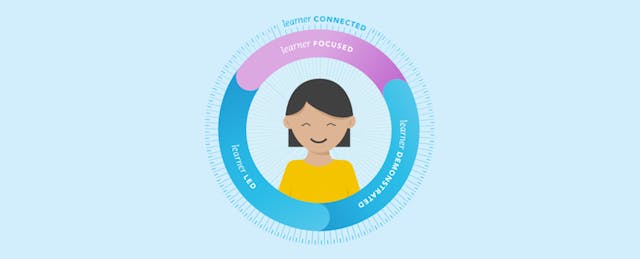A growing number of organizations and districts—from iNACOL to Baltimore County Public Schools—have released frameworks to support schools on the road to personalizing learning for students. Today, LEAP Innovations joins that group.
On April 19, the Chicago-based nonprofit released the LEAP Learning Framework—an interactive resource meant for educators and administrators to use when designing personalized learning instruction and environments.
“The framework is unique in that it includes actionable strategies for teachers and it is part of a suite of tools designed to measure the degree of personalized learning practice happening at the classroom level,” said LEAP Innovations CEO Phyllis Lockett in an interview with EdSurge.
The framework offers three “core components” of personalized learning (learning should be learner-focused, learner-demonstrated, and learner-led), as well as strategies designed by in-school educators on how to achieve those three components. For example:
- For learner-focused learning, where the learning experience is tied to each student’s needs, strengths, and/or interests, the framework suggests that a teacher offer flexible modalities, groupings and times/places for learning.
- For learner-demonstrated learning, where students progress at their own pace based on demonstrated competencies, the framework suggests that learners have access to multiple assessment options. (Think a multiple choice test, oral evidence or rubric-based project, to name a few ideas.)
- For learner-led learning, where students control or take ownership of their own learning, the framework suggests providing learners with ongoing access to their performance data.
LEAP’s announcement also features another development: the LEAP Personalized Learning Surveys, hosted twice a year (once in the fall, and once in the spring). Carried out by the LEAP Innovations team, the surveys are designed to ask teachers and students about personalized learning in the classroom—how it happens, what their experience is like, whether they enjoy it, and so on. Lockett also reports that when LEAP collects the the survey data, she and her team “provide feedback to the educators who take them so that they can improve their practice."
LEAP reports that both surveys were developed in partnership with American Institutes for Research, piloted by Chicago teachers and students last spring, and honed with the help of expert-teacher focus groups. Parties interested in taking part in the surveys can apply here.
With the array of personalized learning resources out there, it can be difficult for a user to choose which is most useful. While LEAP throws its hat into the framework ring, it begs the question of how this framework’s suggestions (and the surveys along with it) are different from the rest. But Lockett is optimistic that these resources offer something different.
“The LEAP Framework was developed in tandem with teachers who had years of classroom experience in personalized learning, and its elements have been validated by research in learning science,” she says.


